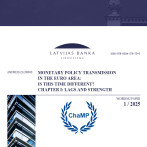Uncertainty curbs money supply growth
Aggravation in external markets, particularly in the euro area, as well as the persistently uncertain domestic political outlook dampened the possibility for businesses to increase their savings, and in September deposits received by banks and the total money supply contracted somewhat, while both household deposits and demand for cash continued on their upward trend. Lending trends remained unchanged for the third consecutive month – a slow increase in loans granted to non-financial corporations and a more pronounced pick-up in those granted in lats persisted, with a fall in loans to households for house purchase contributing to the contraction of the aggregate bank loan portfolio.
A further decline in the aggregate bank loan portfolio notwithstanding, the annual rate of decrease in domestic loans improved to 8.4%. Loans granted in euro continued to shrink whereas those granted in lats grew by 2.6%, with their annual rate of increase reaching 17.9%, a record high in annual terms since spring 2007. The share of lats loans in total loans also expanded (to 9.6%).
In September monetary aggregate M3, which reflects the amount of cash and non-cash instruments in the economy, decreased by 0.3%, with the annual growth of M3 amounting to 2.4%. Bank domestic deposits contracted by 0.5% in September as deposits made by businesses moderated by 2.3%. Foreign currency savings of businesses decreased on account of the high expenditure on imports, while their lats savings shrank as a result of households' willingness to cut their spending and increase their deposits with banks. Hence household deposits grew by 1.1% in September.
In view of the projected second wave of the global economic crisis and the coming winter, both businesses and households are highly likely to maintain a certain safety cushion of savings, thus contributing to the stabilisation of money supply; at the same time risks of a decrease in export income intensified – that could limit the money supply. Lending activity growth in its turn could be limited to a slow increase in loans granted to the most competitive businesses. To promote lending and increase the potential of the Latvian economy during global turmoils, at the current juncture it would be most important to draft the next year's budget with a deficit no higher than 2.5% of GDP (2% would be an optimum) immediately after the new government has been approved, without undue postponing of the approval of the draft Law on Fiscal Discipline which has already been drafted and submitted to the Saeima, and to return to non-deficit budgetary position in 2013.
Textual error
«… …»






